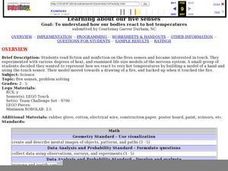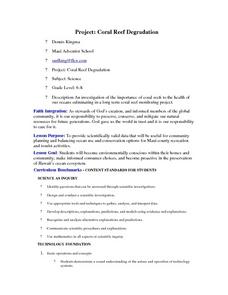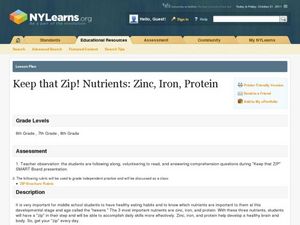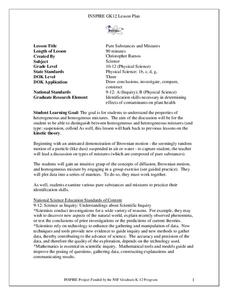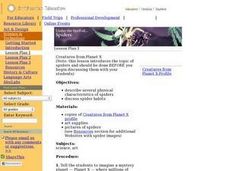Curated OER
MOBILITY, Traveling Lightly: What’s My Footprint?
Students calculate their carbon footprint. In this environmental technology lesson, students listen to a lecture on climate change. Students brainstorm solutions to reduce environmental impact based on travel options. Students calculate...
Curated OER
The Breathtaking Nature of the Urban Explosion, Part 4
Students explore the respiratory system. They use a computer to monitor the respiratory rate of an individual. They determine residual oxygen levels in exhaled air. Students evaluate how internal 02 and C02 concentrations influence...
Curated OER
Thinking inside the Box: Dangers of Tanning Beds
Young scholars research their assigned position pro- or con- for the statement "The use of tanning beds by teens should be regulated" and write a short position paper. They participate in a debate concerning the statement. Students write...
Curated OER
Learning About Our Five Senses
Students study the sense of touch and various degrees of heat. They design a model that displays how the human hand reacts to heat using a touch sensor.
Curated OER
Back Up
Third graders participate in a review game about significant people who have made inventions.
Curated OER
Eat Your Sprouts Part I
Students will conduct a lab on the oxidation of an apple. The students will learn that the oxidation process can be halted when lemon juice is applied to the flesh of an apple because the lemon juice contains vitamin C, an antioxidant....
Curated OER
Coarl Reef Degradation
Middle schoolers explore methods of preserving Hawaii's ocean ecosystem. Using underwater cameras, students take pictures of the underwater reef. They perform activities to determine the history and degradation of the coal reef. While...
Curated OER
Carbon Adventures Game
Sixth graders examine the processes and transformations that occur in carbon pools. They play a game to identify paths taken by carbon through the environment.
Curated OER
Invasive Species
Students use the Internet to research non-native plants that exist in their local community. Using this information, they analyze the invasive species effect on their environment. In groups, they plan and execute their own project to...
Curated OER
Underwater Habitats
Students make a hydrophone and attach it to their Sea Perch ROVs. They use the hydrophones in conjunction with the underwater cameras on the ROVs to explore their local aquatic environments.
Curated OER
The effects of microgravity
Fourth graders are given a scenario in the lesson that presents a problem that needs to be solved. They conduct research from multiple sources in order to gather information. This is used to contribute to possible solutions proposed by...
Curated OER
Subject Selection in Clinical Trials
High schoolers design and conduct an experiment to test a hypothesis. They create a question/objective based on the results of their experiment that can be answered by performing a human clinical trial. Students write inclusion and...
Curated OER
Detection Detective
Students describe what each detection method uses and rank the wavelengths of each if appropriate. They answer questions about absorption, importance of materials and explain differences. Students make sure they describe diagnostic uses...
Curated OER
The Right Tool for the Job: Diagnosis Spectrum
Students watch a section of a medical TV show and individually make a written recommendation of appropriate imaging techniques to be used and explain why they chose these techniques. They participate in a discussion revealing their...
Curated OER
Keep that Zip! Nutrients: Zinc, Iron, Protein
Learners explain the importance of zinc, iron and protein. In this biology lesson, students create a brochure containing information about the three nutrients. They share their brochure in class.
Curated OER
Pure Substances and Mixtures
Students compare and contrast the properties of substances and mixtures. In this chemistry lesson, students simulate spontaneous mixing by performing a short class activity. They differentiate heterogeneous and homogeneous mixtures.
Curated OER
Nutrition in Space
Students discover the importance of a healthy diet during space travel and examine the physiological changes astronauts experience while in space. In groups, they develop questions to determine an astronaut's food intake and identify...
Curated OER
Whose Bud Are You?
Students visit an orchard and examine tree branches. They discover the buds on the branches looking for signs of life. They share their observations in their journals and with their classmates.
Curated OER
Carpooling and the Environment
Students investigate carpooling and determine to what extent it occurs in their community for a carpool challenge. In groups, students create a survey then collect, calculate and record data to determine how much pollution could be...
Curated OER
Building a Mini-park And Bird Sanctuary Lesson 2: Helping Others With a Garden
Learners investigate how gardening can help others through sharing by listening to a read aloud of Shea Darian's, Grandpa's Garden. They examine at least three purposes of gardens and their importance to people.
Curated OER
Safety in the Auto Shop/Laboratory Environment
Students evaluate typical auto shop sectons and layout. They identify safety hazards in the auto shop. Students examine measures to prevent common shop accidents. They discuss general safety rules for the auto shop. Students identify...
Curated OER
Creatures from Planet X: Spiders
Students are given a description of some fascinating animals from "Planet X". They follow the descriptions given to illustrate one of these animals paying careful attention to introduced vocabulary such as 'appendages', 'receptors', and...
Curated OER
Facts, Feats and Folklore: Spiders
Students review and discuss a variety of sayings, folklore and superstitions about spiders. They discuss this information and choose either an interesting fact or appealing foklore tradition to illustrate.
Curated OER
Biological Sampling Device Using a Sea Perch
Students construct plankton nets to be towed and collect specimens to be examined and analyzed in the classroom. They develop research skills through collection of an aquatic sample. They write lab reports after interpreting, identifying...



